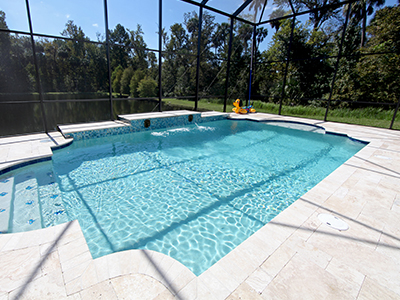The Pros and Cons of a Salt Water Pool
Salt water pools are a popular alternative to traditional chlorine swimming pools, and for good reason.
They’re cheaper to maintain and won’t leave you with burning eyes and dried-out skin. But are they worth the hype?
We’re taking a deep dive into the salt water pool phenomenon and giving you the details.
What is a salt water pool?
Contrary to what some say, swimming in a salt water pool isn’t like taking a dip in ocean water. That intensely salty flavor requires ten times higher salinization levels than we’re talking about here. Instead, this type of pool uses a lower salt concentration that’s converted through a chemical reaction to produce chlorine.
Salt systems use an electrode to separate the two elements of salt: sodium and chloride. Electrolysis produces pure chlorine, which reacts with water to create hypochlorous acid. It’s this substance that cleans your pool. So, in essence, you’ve still got a chlorinated pool. It just gets there through a different method.
The benefits of installing a salt water system in your pool
Installing a salt water system in your pool brings some significant advantages. When choosing which system you’ll use, it’s essential to understand what you gain.
Salt water is softer on the body
Store-bought chlorine additives have a nasty side effect, we’re sure you know. A byproduct of these chemicals causes burning eyes, dried-out hair, and itchy skin. Chloramines give traditional pool water its distinctive smell and consequences.
Using salt instead decreases the amount of chloramines in the water significantly. Swimming in salt water pools is better for your body, and the water even feels different. You’ll luxuriate in the smoother sensations of this cleaning method.
Salt water pools are safer than chlorine pools
Storing harsh cleaning chemicals can actually be dangerous, as many homeowners discover. Fun fact: chlorine pools require storing volatile chemicals close to your family and property. If mixed, different types of chlorine can explode instantly. The gasses created may be lethal.
You save money on chemical usage
You’ll save money because your salt water pool only generates enough chlorine to keep the water clean. When there’s enough NaCL in the pool, it’ll maintain itself.
Chlorine pools require weekly maintenance and frequently require “shocking,” or the addition of high amounts of the chemical.
Less maintenance is required
Salt water pools require very little maintenance as long as they work correctly. Electrolysis ensures the lowest amount of chlorine necessary in the water.
With traditional pool care, you’ll be out there testing the water and adding chemicals to maintain levels. You’ll also have to add other chemicals to balance the pH and reduce the hardness of the water.
Any size pool can be turned into a salt water pool
If you’ve got an existing pool on your property that you want to convert to salt water, size doesn’t matter. Large or small, conversion isn’t terribly expensive and can adjust to fit the largest pools. Initially, for bigger sizes, you may need to add more salt. Make sure to test the water first, so you’re not adding more than it requires.
They increase your home’s value
While chlorine pools can be a drawback to some homebuyers due to maintenance costs, these are different. Since salt water pools require less maintenance and chemical storage, they add value to your home. Some studies show this could be as high as 5 to 8 percent in the right market.
Downsides of a salt water pool
As great as salt water pools sound, there are some drawbacks. Whether or not they’re enough to stop you from installing one is up to you.
Upfront payment is more expensive
When you’re installing a pool, you’re already talking about a significant investment. An inground vinyl or fiberglass pool in Florida runs between $28,000 and $60,000. Compared to chlorinated systems, they require more expertise to install and repair.
A salt water system can run anywhere between $1,400 – $2,400 plus the cost to have a licensed technician install it
Your equipment may take damage
Regular pool equipment won’t survive in a highly salinated environment. Salt corrodes metal, so you must purchase specific lighting, heaters, fixtures, and liners that work in that setting. If you’ve already invested in pool hardware, replacement costs can add up quickly.
Salt water pools require more expertise if you run into a problem
You shouldn’t be poking around in any pool filtration system unless you’re a licensed pool technician. Issues with water quality in a chlorine pool are frequently fixable by the DIYer with the right tools. However, because of the complex electrolysis system in a salt water pool, only experts should touch them.
They’ll be able to repair any issues and make sure the water is safe for swimming.
Contact GPS Pools for a quote on salt water systems for your pool!
Deciding whether to install or convert your pool to salt water isn’t easy. There’s lots of information on both sides, requiring a significant investment. Our team at GPS Pools has over 20 years of experience with different pool systems and maintenance. Let our expert technicians take a look at your plans and help you find the best solution for your situation.
Let our team take care of all your salt water pool needs. Check out our website or stop into one of our locations.

